- Home
- Patrick Ness
The Crane Wife Page 13
The Crane Wife Read online
Page 13
‘What is that?’
And before she even looked up, she was cursing herself for being stupid enough to bring it anywhere on earth that Rachel might see.
The tile had been a present, unasked-for and unexpected. After getting over her initial shock on that unlikely morning on the park bench – that here was Kumiko, in a forlorn, barely green square lined with scraggly bushes and the requisite statue of a forgotten man on a forgotten horse – they’d begun to talk. And how they’d talked. Of their shared hatred for cyclists (‘All that self-righteousness,’ Kumiko had said, allowing a frown to make her face even prettier, ‘and then they act like it is your fault when they run the red light and nearly knock you down.’ ‘And they smell,’ Amanda had said. ‘Just because you change out of your gear at work doesn’t actually mean you’ve had a shower.’ ‘And the fold-up ones,’ Kumiko continued, to Amanda’s increasing delight and astonishment, ‘they put it in your way on a train and it seems as if you are supposed to treat it with the respect of an elderly relative.’ ‘I know!’); how they both, contrarily, felt weirdly protective of those charity people with the clipboards who had turned eye contact into such a risk on the High Street (‘They are only trying to do a job,’ Kumiko said. ‘And they’re all so young,’ Amanda said, ‘and all probably out-of-work actors.’ ‘It is certainly better than being forced to watch them act.’); and Amanda had even ventured her opinion on the Animals In War Memorial. Kumiko, remarkably, hadn’t heard of it, so Amanda explained it to her.
‘Well, that sounds like an incredible waste of money,’ Kumiko said.
Amanda could have cried.
And then, too soon, lunch hour was nearly over. It was time for a ravenous but also somehow satisfied Amanda to go back to the office, and that’s when Kumiko said, ‘I would like to give you something.’
‘Can I eat it?’ Amanda asked, having suffered the loss of both her coffee and her sandwich. She’d declined Kumiko’s offer to share her rice and fish, but she was severely regretting that choice now.
Kumiko smiled. ‘You could eat it,’ she said, opening the small suitcase she carried instead of a handbag, ‘but the flossing afterwards might be lengthy.’
And handed Amanda the tile.
‘I couldn’t possibly,’ Amanda said, stunned. ‘I really mean it, I couldn’t possibly.’
‘Do you like it?’ Kumiko said shyly. Amanda was flabbergasted to see that the question was meant sincerely. She looked back down at the tile, at the improbable beauty of it, at its unlikely uplift, at the way she didn’t seem to be looking at it but already dwelling within it. She couldn’t help but try to decline it as a far too valuable gift, but her heart, oh, how her heart wanted it, wanted it, wanted it . . .
‘Do I like it?’ Amanda whispered, unable to take her eyes off it now. ‘Do I like it?’
She kept looking at it. And looking at it again. And more.
‘It feels like . . .’ she whispered. ‘It feels like . . .’
She looked up to say either ‘love’ or ‘forgiveness’, unsure of which was about to come out of her mouth, and was astonished to see that Kumiko had gone. A small cloth bag, obviously meant for carrying the tile, lay on the bench.
And somewhere, maybe even on the wind, was the permission to keep it.
Further meetings with Kumiko had been strangely difficult to come by.
‘She was just right here, Dad,’ Amanda had said in a call to George made as she stood up from the bench (after carefully, but quickly, putting the tile in the bag; it was already getting lingering looks from other bench-sitters). ‘I mean, how is that even possible?’
‘I don’t know, sweetheart.’ His words were a close whisper, over what sounded like a particularly unhappy customer in his shop. ‘But did you like her?’
‘Like her? I want to marry her!’
George made a sound of relief so boyish, Amanda felt momentarily overwhelmed by a need to somehow hug her father over the phone. ‘What’s going on there? Mehmet misspell someone’s order on purpose again?’
‘Just someone who had put down money for the next tile,’ he said, a bit of strain in his voice. He paused as the door of the shop was slammed so hard Amanda could hear it over the phone. ‘We were supposed to have a new one ready today, but at the last minute Kumiko decided she couldn’t sell it. It didn’t go down too well, as you might imagine.’
‘Does she often do that?’ Amanda asked carefully, holding the bag in front of her, trying to keep it from getting nudged as she weaved through the crowded pavement on her way back to work. ‘Decide not to sell?’
‘Not really,’ George said. ‘Well, never, actually–’
‘Did she think something was wrong with it?’
There was a surprised silence from George. ‘I don’t know,’ he said. ‘I didn’t actually see it. She just called, said she didn’t think it was for sale, and that was that. I tend to just trust her on these things. She didn’t say anything to you about it, did she?’
‘No, no,’ Amanda murmured. She kept looking at the bag as George talked on, giving monosyllabic but positive responses to his questions about Kumiko, all the while fighting her unexpected reluctance to tell him about the tile she’d been given.
‘It’s all passingly strange,’ she finally said, and ended the call.
Next time, she thought. I’ll tell him next time.
But she was wrong.
In the weeks that had followed, not only had Amanda been unable to arrange a further meeting with Kumiko, her father became harder to get hold of, too, even to look after JP. He was either on a brief holiday with Kumiko to the Highlands (of all places) or busy making his cuttings or buying new equipment for the shop. He did finally set a date for the party where he’d properly introduce her to everyone, including some of the art buyers – who’d apparently been applying increasing pressure about meeting her – and it was gratifyingly soon, but Amanda found herself hungry for more, though she was never quite clear on more of what.
‘He says he’s nearly made enough to pay off the last bit of his mortgage,’ she told her mother one evening, who sounded personally offended at the news.
‘How is that even possible? Are they that good?’
‘Yeah,’ she said, looking at her tile again. ‘Yeah, they really are.’
‘Is it wrong for me to be upset that George is finally out-earning me now that we’re divorced?’
‘It’s been nine years, Ma.’
Clare sighed. ‘Feels so much shorter.’
‘How’s Hank?’
‘Oh, you. I’m not jealous, and I don’t suddenly want him back now that he’s rich. George is nice, but he’s nice all the way through. I need someone who’ll push back or I’ll just turn into a bully, and who wants that? I’m just surprised is all. Surprised but pleased. Yes, pleased.’
‘You sure?’
‘Darling, wouldn’t you want to be the person who’d made someone do that well? Wouldn’t that be a nice feeling?’
‘Hank’s loaded.’
‘He was loaded when I met him. I get no credit.’
‘But you’re not jealous.’
‘Stop with the teasing. You say this Kumiko is lovely, and I believe you. I’m happy for him. For them. She’s lucky to have him.’
‘And he’s lucky to have her,’ Amanda said firmly.
And wondered for a moment exactly what she meant.
When she was at home, she hung the tile over the television, not for any other reason than that there was a hook there already for an old French movie poster that had been there so long she almost literally no longer saw it. She took it down and hung the tile in its place.
‘What is it?’ JP asked the first time, wide-eyed.
She went to answer, but everything suddenly seemed too complicated to explain in terms of animal characters, so she just said, ‘Art.’
‘Okay,’ JP accepted solemnly, and didn’t even launch into the avalanche of questions she had braced herself for. He merely looked at it
for a long, quiet moment, and then he said, ‘Can I watch Wriggles in the Jazz Age?’
Amanda stared at him for a confused moment. ‘Stone Age.’
‘That’s what I said.’
‘Yeah, you know how to work the thingy.’
As JP grabbed the array of remotes required to bring up the downloaded Wriggles on the telly, Amanda watched the tile, watched the bird and the mountain, thinking that maybe they were Kumiko and her father and then again, maybe not. She also thought that, though it was hardly bigger than a dinner plate, it was also somehow bigger than the room, bigger than her whole life, and the more she looked, the more it threatened to spill over from its world into hers.
And as time passed, she never actually got around to mentioning the tile to either of her parents. From the things he said, it didn’t seem as if Kumiko had told George about it either. Nor did JP ever bring it up to him, and while she certainly wasn’t going to ask her wee little son to lie, somehow, without her even trying, it was never an issue. It became a secret they’d all wordlessly agreed to keep.
So she just kept looking at it.
In those same weeks, even before she caught the glimpse of the tile, Rachel had grown strangely friendlier.
‘You want to join us for lunch?’ she’d asked one day, Mei in tow.
Mei was astonished. ‘Really?’
‘Really?’ Amanda echoed.
‘Girls in the office?’ Rachel said. ‘Need to support each other? Not let stupid stuff get in the way?’
‘Really?’ Mei said again.
‘Yes, really,’ Rachel snapped. ‘We’re all grown-ups here?’
‘Thanks,’ Amanda said, ‘but I’ve got plans.’
‘Suit yourself,’ Rachel said, and off they went.
But that hadn’t been the end of it.
‘Thought we might go to the cinema tomorrow?’ Rachel said, appearing on a Friday morning. ‘Make fun of Anne Hathaway’s accent? Then knock back a few cocktails?’
Amanda had watched her, suspiciously. ‘Is that an invitation?’
Rachel’s face made an angry, scoffing shape but quickly recovered. ‘Look,’ she said, ‘how many times do I need to say I’m sorry?’
Amanda opened her mouth, closed it, opened it again. ‘Once?’
‘So? The cinema?’
‘I’ve got JP–’
‘No worries.’ And off she went again.
It was weird, and in a way worse than when they were just friends who hated each other. Rachel was as unreasonably demanding as ever about getting work in, but the invitations kept coming, until finally she’d relented and gone for lunch at the latest gourmet burger chain.
‘Do you think this is actually Emmental?’ Amanda asked, lifting up the bun.
‘I can’t believe they put cheese that fancy on a burger,’ Mei said.
‘Fancy?’ Rachel sneered. ‘Who says “fancy”?’
Mei looked slightly confused. ‘I just did?’
‘How’s it going with Wally?’ Amanda asked, taking a bite of the burger.
‘Wally is like a huge prick?’ Rachel said, cutting her own veggie burger in two.
‘Is a huge prick,’ Amanda said, ‘or has?’
Rachel slammed down her knife and fork, startling everyone, even nearby tables. ‘You know what?’ she nearly shouted. ‘I’m a good person!’
A quiet fell over their section of the restaurant. Mei looked at Amanda, then back at Rachel. ‘Well,’ Mei said, ‘I mean, you’re okay–’
‘Who says you’re not a good person?’ Amanda asked, actually interested, though not so interested that she failed to take another bite of burger.
‘I know I’m difficult? All right? But I think you have to be? To be a woman in business? And to make it in life and not be a, be a, be a–’
‘Chump?’ Mei suggested, sipping from her pistachio milkshake.
‘Yes, not be a chump! I thought that was the whole point?’
‘What are you talking about?’ Amanda asked.
Rachel sighed heavily, and there suddenly seemed to be actual tears in her eyes. ‘Don’t you just get tired of having to hate everybody?’
‘I don’t hate everybody,’ Amanda said.
‘Yes, you do!’ Rachel said. ‘You complain about everybody and everything! Like, all the time?’
‘Well . . .’ Amanda sat back. ‘Not everybody.’
‘Who do you like? Tell me.’
Rachel’s insistence was so nakedly hungry, Amanda answered almost as if to defend herself. ‘I love my son so much I sometimes miss him even when he’s sitting right there.’
‘Oh, me, too,’ Mei sympathised. ‘My daughter–’
‘Child,’ Rachel said, curtly. ‘Doesn’t count.’
‘I love my dad.’
‘George,’ Rachel nodded.
‘I loved Henri.’
‘Did you?’ Mei asked, eyes wide.
Amanda looked down at her burger, suddenly a little less hungry, remembering that night he’d stopped by, the night he hadn’t mentioned again on any of his subsequent calls to JP. ‘Yeah.’ She looked back up at them. ‘Yes, more than I can say.’
‘So you’re lucky then,’ Rachel said. ‘At least you’ve had somebody. I’m just so tired of hating everyone and myself and the two of you–’
‘Hey!’ Mei said.
‘Oh, please,’ Rachel pffted. ‘I don’t even know why I’m here. Do you? I don’t even know why I’m trying to–’
She stopped, her face scrunching up in some really, really unattractive crying. She stood suddenly, so quickly the chair behind her fell over. She took one look at it and fled the restaurant. Yes, Amanda thought, fled was the right word.
‘Wow,’ Mei said, turning back to Amanda. ‘Do you think you should go after her?’
‘Not me,’ she said, shaking her head. ‘You.’
Mei acknowledged this was probably true, grabbed her bag and left without saying goodbye. Or paying for anyone’s share of the bill.
Amanda stayed, pondering the conversation and finishing her burger. And what the hell, a few bites of Mei’s, too.
Back at work, Rachel pretended the outburst had never happened, which wasn’t a surprise, but she still kept up the almost-friendliness campaign, which was. And should also have been a warning, should have given Amanda greater pause before even thinking about risking the tile at work, because here, inevitably, was the moment that probably almost had to happen: Rachel standing there, her eyes laser-like on the now-hastily-being-shut drawer.
‘That was–’ Rachel started to say.
‘None of your goddamn business, is what it was,’ Amanda said sharply.
‘I’ve never seen one in person?’
Amanda stared her down. ‘I don’t know what you’re talking about.’
‘Amanda–’
‘Can I help you with something, Rachel?’
And then, once more, there was a strange moment. Rachel’s eyes seemed to flicker and she hesitated. Then she looked down, crestfallen, at the papers in her hand and started walking away. Who are you, Amanda thought, and what have you done with Rachel?
But as she watched Rachel’s unfeasibly shapely bottom shuffle off in defeat, Amanda found herself feeling an emotion so unassociated with her that it took her a minute to identify it properly. It was pity. Worse, it was recognition. She looked at Rachel and suddenly saw a fellow-traveller across that baffling, hostile landscape she knew all too well, the one whose entire set of rules seemed to exist for you to never properly learn and therefore be forever excluded, no matter how much you pretended it didn’t matter.
For Rachel, it might have even been worse, because she had known the rules for a long time, had thrived on them, and had maybe now – if her equally unprecedented lunch outburst was anything to go by – found them empty. What happened to a person then? If she was trying this badly to be friends with Amanda, of all people, and doing it this incredibly incompetently, then what did that mean? Amanda realised she knew. As much as sh
e still didn’t actually like Rachel – because that seemed several bridges and an ocean too far – she glimpsed a harrowing sliver of understanding about her.
Rachel was lonely. And where Amanda had known that feeling her whole life, Rachel seemed to have just woken up to the possibility she’d been lonely all along.
‘Rach?’ she found herself saying.
Rachel turned back, her green eyes watery, but ready to be defiant. ‘What?’
Amanda’s hand hovered over her desk drawer before deciding that no, she couldn’t do that. No matter how much pity she had for Rachel, it wasn’t enough to share this, not yet, probably not ever, not something this private, this hers.
So she found herself inexplicably doing the next best thing, regretting it even as the sentence fell clumsily from her lips. ‘My father’s having a party to introduce people to Kumiko. There’ll probably be artwork there.’ She swallowed, as if to stop herself, but somehow the words kept being spoken. ‘Do you want to come along?’
Rachel’s smile of acceptance was any number of things. It was grateful, it was unnervingly bright, but mostly, Amanda’s heart quailed to see, it was triumphant.
13 of 32
‘You have changed,’ the lady says.
‘I have,’ says the volcano. ‘And I have not.’
She flies in her usual cautious circle around the open skies above his factories. ‘You are a man of peace.’
‘I am not currently a man of war, my lady. It is not the same.’
‘Yet you create, you build, you add to the world.’
‘It is what volcanoes do. Until we are tamed into mountains.’
‘You tease me.’
‘And you taunt me, my lady.’
She lands, placing her feet on the peaked roof of a factory. The billowing black smoke it produces does not sully her clothing or her skin. It flows around her, leaving her untouched.

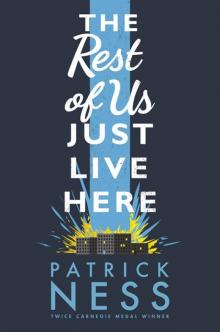 The Rest of Us Just Live Here
The Rest of Us Just Live Here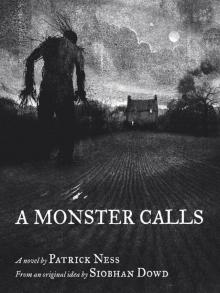 A Monster Calls
A Monster Calls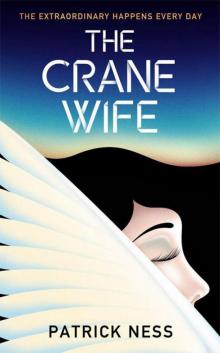 The Crane Wife
The Crane Wife Release
Release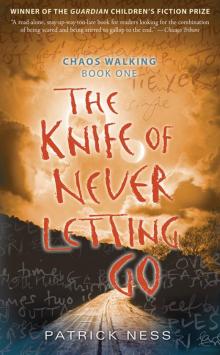 The Knife of Never Letting Go
The Knife of Never Letting Go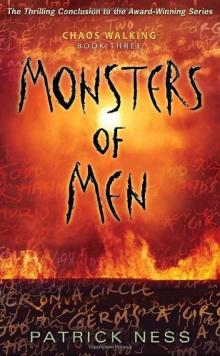 Monsters of Men
Monsters of Men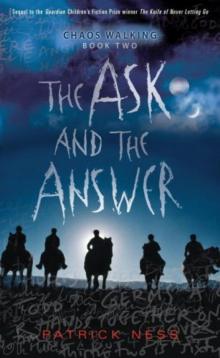 The Ask and the Answer
The Ask and the Answer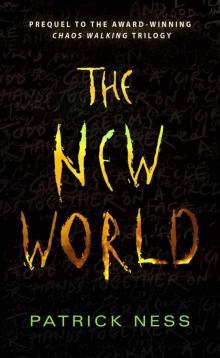 The New World
The New World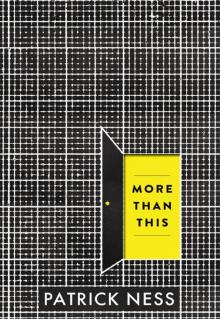 More Than This
More Than This Burn
Burn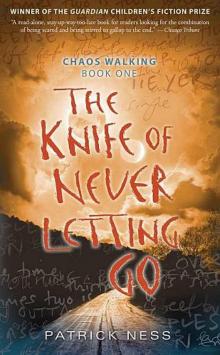 The Knife of Never Letting Go cw-1
The Knife of Never Letting Go cw-1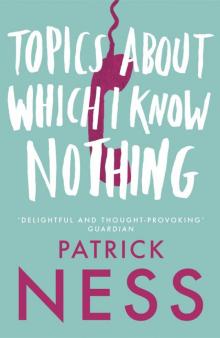 Topics About Which I Know Nothing
Topics About Which I Know Nothing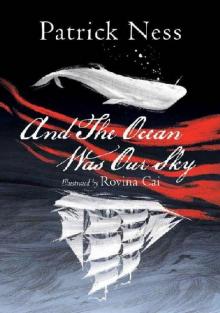 And The Ocean Was Our Sky
And The Ocean Was Our Sky The Stone House
The Stone House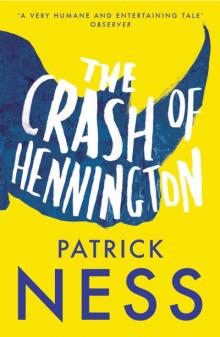 The Crash of Hennington
The Crash of Hennington Joyride
Joyride What She Does Next Will Astound You
What She Does Next Will Astound You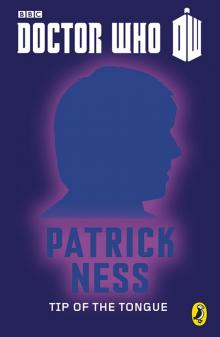 Tip Of The Tongue
Tip Of The Tongue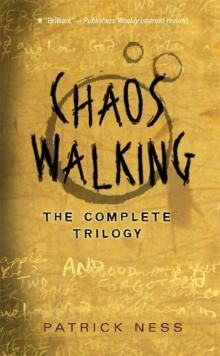 Chaos Walking
Chaos Walking